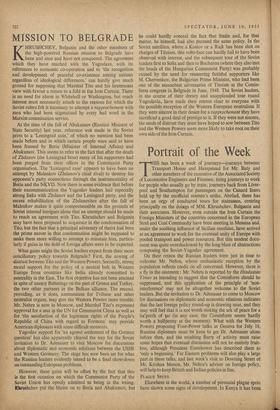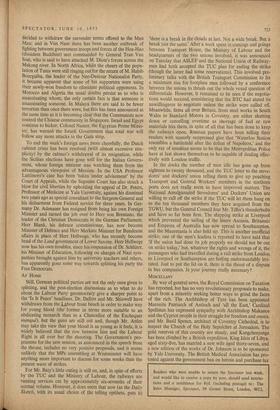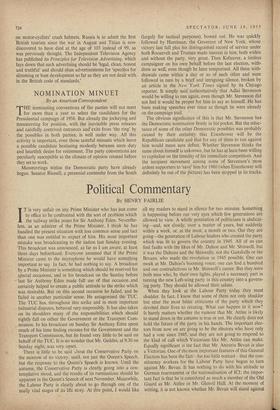Portrait of the Week
THIS has been a week of journeys—journeys between Transport House and Hampstead for Mr. Baty and other members of the executive of the Associated Society of Locomotive Engineers and Firemen; tiring journeys to work for people who usually go by train; journeys back from Liver- pool and Southampton for passengers on the Cunard liners held up by the unofficial seamen's strike. Abroad, there has been an orgy of conducted tours for statesmen, centring principally on the doings of MM. Khrushchev, Bulganin and their associates. However, even outside the Iron Curtain the Foreign Ministers of the countries concerned in the European Steel and Coal Community have been meeting in Messina and. under the soothing influence of Sicilian sunshine, have arrived at an agreement to work for the eventual unity of Europe with pooled transport and power resources. But this modest docu- ment was quite overshadowed by the long blast of abstractions composing the Soviet-Yugoslav agreement.
On their return the Russian leaders were just in time to welcome Mr. Nehru, whose enthusiastic reception by the population reflects credit on all concerned. However, there is a fly in the ointment: Mr. Nehru is reported by the Hindustan Times as intending to suggest that the Cominform should be suppressed, and this application of the principle of 'non- interference' may not be altogether welcome to the Soviet leaders. But the invitation to Dr. Adenauer to come to Moscow for discussions on diplomatic and economic relations indicates that the last foreign policy round-up is drawing near, and they may well feel that it is not worth sinking the ark of peace for a ha'porth of tar (in any case, the Cominform seems hardly worth a halfpenny at the moment). What with the Western Powers proposing Four-Power talks at Geneva for July 18, Russian diplomats must be keen to get Dr. Adenauer alone before then, and the resulting flurry of activity must raise some hopes that eventual discussion will not be entirely fruit- less, although President Eisenhower has described them as 'only a beginning.' Far Eastern problems will also play a large part in these talks, and last week's visit to Downing Street of Mr. Krishna Menon, Mr. Nehru's adviser on foreign policy, will help to keep British and Indian policies in line.
PLAGUE SPOTS decided to withdraw the surrender terms offered to the Mau Mau; and in Viet Nam there has been another outbreak of fighting between government troops and forces of the Hoa-Hao (dissident Buddhist) sect commanded by General Tran Van Soai, who is said to have attacked M. Diem's forces across the Mekong river. In North Africa, \Wile the cheers of the popu- lation of Tunis were still ringing out for the return of M. Habib Bourguiba, the leader of the Neo-Destour Nationalist Party, it became apparent that some of his supporters were using their newly-won freedom to eliminate political opponents. In Morocco and Algeria the usual doubts persist as to who is assassinating whom; the only certain fact is that someone is assassinating someone. In Malaya there are said to be fewer terrorists than once there were, but this has been announced at the same time as it is becoming clear that the Communists now control the Chinese community in Singapore. Israel and Egypt continue to bicker; Colonel Nasser, the Egyptian Prime Minis- ter, has warned the Israeli Government that total war will follow any more attacks in the Gaza strip.
To end the week's foreign news more cheerfully, the Dutch cabinet crisis has been resolved (with almost excessive sim- plicity) by the cabinet's withdrawal of its resignation, while the Sicilian elections have gone well for the Italian Govern- ment, whose foreign minister was watching them from the advantageous viewpoint of Messina. In the USA Professor Lattimore's case has been 'taken under advisement' by the Court of Appeals, while the Supreme Court has also struck a blow for civil liberties by upholding the appeal of Dr. Peters. Professor of Medicine at Yale University, against his dismissal two years ago as special consultant to the Surgeon-General and his disbarment from Federal service for three years. In Ger- many Dr. Adenauer has resigned from being his own Foreign Minister and turned the job over to Herr von Brentano, the leader of the Christian Democrats in the German Parliament. Herr Blank, his defence commissioner, has now become Minister of Defence and Herr Merkatz Minister for Bundesrat affairs in place of Herr Hellwege, who has recently become head of, the Land government of Lower Saxony. Herr Hellwege now has his own troubles, since his suspension of Dr. Schliiter, his Minister of Education, following on aharges of Nazi sym- pathies brought against him by university teachers and others, has apparently gone some way towards splitting his party the Free Democrats.
AT HomE Still, German political parties are not the only ones given to splitting, and the post-election discussions as to what to do about the Labour Party gerontocracy give a sharper point to the 'Is It Peace' headlines. Dr. Dalton and Mr. Shinwell have withdrawn from the 1,abour front bench in order to make way for young blood (the former in terms more suitable to an abdicating monarch than to a Chancellor of the Exchequer manque), but the guns are still out and, though Mr. Attlee may take the view that your blood is as young as it feels, it is widely believed that the row between him and the Labour Right is all over bar the shooting. The Government's pro- gramme for the new session, as announced in the speech from the throne, includes no very positive proposals, and it seems unlikely that the MPs assembling at Westminster will have anything more important to discuss for some weeks than the present wave of strikes.
For Mr. Baty's little outing is still on, and, in spite of efforts by the TUC and the Ministry of Labour, the railways are running services cut by approximately six-sevenths of their normal volume. However, it does seem that now (as the Daily Sketch, with its usual choice of the telling epithets, puts it) 'there is a break in the clouds at last. Not a wide break. But a break just the same.' After a week spent in comings and goings between Transport House, the Ministry of Labour and the headquarters of the two unions involved, it was announced on Tuesday that ASLEF and the National Union of Railway- men had both accepted the TUC plan for ending the strike (though the latter had some reservations). This involved pre- liminary talks with the British Transport Commission to fix a minimum rise for footplate men followed by a conference between the unions to thrash out the whole vexed question of differentials. However, it remained to be seen if the negotia- tions would succeed, considering that the BTC had stated its unwillingness to negotiate unless the strike were called off. Meanwhile, firms all over Britain, from steel works in South Wales to Standard Motors in Coventry, are either shutting down or cancelling overtime as shortage of fuel or raw materials hits them, in spite of all that has been done to keep the railways open. Russian papers have been telling their readers with scarcely suppressed glee that 'Waterloo Station resembles a battlefield after the defeat of Napoleon,' and the only ray of sunshine seems to be that the Metropolitan Police have at last shown themselves to be capable of dealing effec- tively with London traffic.
In the docks the number of men idle has gone up from eighteen to twenty thousand, and the TUC letter to the steve- dores' and dockers' union telling them to give up poaching Transport and General Workers' members in the northern ports does not really seem to have improved matters. The National Amalgamated Stevedores' and Dockers' Union are willing to call off the strike if the TUC will let them hang on to the ten thousand members they have acquired from the TGWU, but the General Council fear Mr. Tiffin's thunderbolts and have so far been firm. The shipping strike at Liverpool which prevented the sailing of the liners Ascania, Britannic and Empress of Australia has now spread to Southampton, and the Mauretania is also held up. This is another unofficial strike; one of the men's leaders is reported to have said that 'if the union had done its job properly we should not be out on strike today,' but, whatever the rights and wrongs of it, the passengers who had travelled during a rail strike from London to Liverpool or Southampton are feeling understandably irri- tated. Just to put the lid on it, there is the threat of a dispute in bus companies. Is your journey really necessary?
MISCELLANY
By way of general news, the Royal Commission on Taxation has reported. but has no very revolutionary proposals to make, apart from a minority seeking better ways to grind the faces of the rich. The Archbishop of Tyre has been appointed Maronite Patriarch of Antioch and 'all the East,' Cardinal Spellman has expressed sympathy with Archbishop Makanos and the Cypriot people in their struggle for freedom and enosis, and Mr. Basil Spence. architect of Coventry Cathedral, is to inspect the Church of the Holy Sepulchre at Jerusalem. The gold reserves of this country are steady, and Kangchenjunga has been climbed by a British expedition. King Idris of Libya, aged sixty-five, has married a new wife aged thirty-seven, and a new edition of the works of Dr. Johnson is to be sponsored by Yale University. The British Medical Association has pro- tested against the government ban on heroin and purchase tax on motor-cyclists' crash helmets. Russia is to admit the first British tourists since the war in August and Titian is now discovered to have died at the age of 103 instead of 99, as was previously thought. The Independent Television Agency has published its Principles for Television Advertising, which lays down that such advertising should be 'legal, clean, honest and truthful' and should shun advertisements for 'specifics for slimming or bust development so far as they are not dealt with in the British code of standards.'












































 Previous page
Previous page